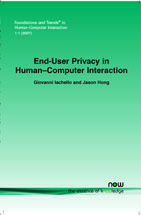End-User Privacy in Human–Computer Interaction
By Giovanni Iachello, Georgia Institute of Technology, USA, giac@cc.gatech.edu | Jason Hong, Carnegie Mellon University, USA, jasonh@cs.cmu.edu
Abstract
The purpose of this article is twofold. First, we summarize research on the topic of privacy in Human–Computer Interaction (HCI), outlining current approaches, results, and trends. Practitioners and researchers can draw upon this review when working on topics related to privacy in the context of HCI and CSCW. The second purpose is that of charting future research trends and of pointing out areas of research that are timely but lagging. This work is based on a comprehensive analysis of published academic and industrial literature spanning three decades, and on the experience of both ourselves and of many of our colleagues.
End-User Privacy in Human-Computer Interaction
End-User Privacy in Human-Computer Interaction surveys the rich and diverse landscape of privacy in Human-Computer Interaction (HCI) and Computer Supported Cooperative Work (CSCW), describing some of the legal foundations and historical aspects of privacy, sketching out an overview of the body of knowledge with respect to designing, implementing, and evaluating privacy-affecting systems, and charting many directions for future work. The authors first summarize the research that has been done on the topic over the past three decades, outlining current approaches, results, and trends. They proceed to chart future research trends and point out areas of research that are timely but lagging. In summarizing thirty years of privacy research in HCI and CSCW, End-User Privacy in Human-Computer Interaction helps to shed light on many of the salient issues and will help practitioners and researchers alike explore these complex issues in a more informed and conscious way.
